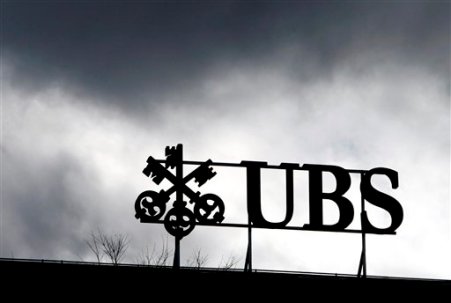With asset withdrawals waning, the Swiss bank booked its largest quarterly profit in almost three years
UBS AG, Switzerland's biggest bank, reported the highest quarterly profit in almost three years after a rebound at the debt trading unit.
UBS rose as much as 4.3 percent in Swiss trading after the company said pretax profit was at least 2.5 billion Swiss francs ($2.4 billion) in the first-quarter, the highest level since the second quarter of 2007.
Chief Executive Officer Oswald Gruebel, who joined the Zurich-based bank in February 2009, is relying on a recovery in fixed-income trading to help the bank reach an annual pretax profit of 15 billion francs in the next three to five years. The debt unit, headed by Rajeev Misra and Dimitri Psyllidis since January, reaped about $2.3 billion of revenue in the quarter, people familiar with the matter said on March 29.
“Gruebel's first point of action was to rebuild the debt business and that's paying off,” said Florian Esterer, who helps manage about $47 billion, including UBS shares, at Swisscanto Asset Management in Zurich. “The investment bank is making good progress, while the issue of rebuilding the private- banking franchise still remains.”
UBS was up 3.9 percent at 18.36 francs by 12:07 p.m., valuing the bank at 70.3 billion francs. The stock has climbed 14 percent this year, beating a 4.5 percent increase in the 52- company Bloomberg Europe Banks and Financial Services Index and an 8 percent gain at Credit Suisse Group AG in the same period.
UBS said last month that the $2.3 billion revenue figure for the debt unit was “slightly higher” than its current estimate for the period. The bank, which didn't comment on the fixed-income division today, will publish detailed first-quarter results on May 4.
The company said in November it would aim for quarterly revenue of more than 2 billion francs at the fixed-income division in three to five years, bringing it back to pre-crisis levels. Misra, 48, and Psyllidis, 43, took over the unit after former co-heads Carsten Kengeter, 43, and Jeffrey Mayer, 51, became co-head of the investment bank and executive chairman of the debt unit, respectively.
Gruebel, 66, a former Eurobond trader, hired about 350 people for the fixed-income unit, which includes foreign exchange and commodities trading, in the past year.
The bank also said today that net client withdrawals from its wealth management units amounted to about 15 billion francs, down from 45.2 billion francs in the fourth quarter. Asset management had net outflows of about 3 billion francs in the first quarter, UBS said. The bank has seen 373.3 billion francs of net redemptions in the two years through the end of 2009.
“First-quarter outflows are a positive surprise,” said Teresa Nielsen, an analyst at Vontobel Holding AG with a “buy” rating on UBS, who had forecast redemptions of 39 billion francs for the period. “The news will have a positive impact on the sentiment for UBS.”
At its annual shareholders' meeting on April 14, UBS will seek approval for management's actions in the years 2007 through 2009, when it reported a cumulative 29.3 billion francs in net losses. The bank had postponed the vote during the previous two years while trying to clarify the causes of its losses in the credit crisis, the second-biggest among European banks after Royal Bank of Scotland Group Plc.
Ethos Foundation, a Swiss activist shareholder group, last month recommended investors refuse approval for the actions of UBS's management and board of directors, “who are responsible for the bank's enormous losses over the past few years.”
UBS last year decided not to file any charges against its former executives and board members, including former Chairman Marcel Ospel, after about 10 internal and external investigations into the bank's losses over the past two years.
“The bank is not attempting to shun its past,” UBS said in a statement on its Web site last month. “We are confronting the question of civil liability and give our shareholders the right to decide.”







